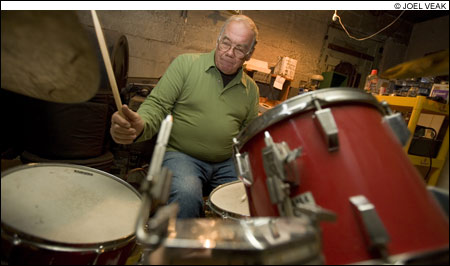Don McBride sits in the low light of his musty Allston antiques store, surrounded by a pink dollhouse, a lamp adorned with two geisha-girl statuettes, an African tribal mask, three or four of the seven dwarves, a tacky bar set equipped with a glowing faux fireplace, a French dining-room set from the ’40s, and a dark-wood bureau that is, McBride says, “what we call in the trade ‘a real Beacon Hill piece.’ ”

LOCAL INSTITUTION: Don McBride's store is a heaven for unique antique collectors and jazz lovers alike. |
This weekend, McBride’s Furniture on Brighton Avenue will have a liquidation sale, after which it may or may not stay open for another week or so. And then, with the simultaneous closing of What Once Was, the store next door that occupies McBride’s sublet space, Allston will be bereft of antique stores.
But that’s not all it will be missing.
McBride, 70, with his broad face, boxer’s nose, barrel chest, huge hands, and meat-and-potatoes Boston accent, is a throwback. In a way, it seems natural for him to spend his days surrounded by dusty relics. He’s been in the antiques business for more than 35 years, having run or co-run five stores in Allston and environs. But the antique business isn’t what it used to be. The Internet has adversely affected stores like McBride’s. And Allston itself has changed.
“People from the outskirts used to come into Allston just for [antiques],” he says. Not so much anymore. Retailers have given way to small restaurants. Bars. College kids. It doesn’t attract the same sort of foot traffic. So, with rumors that the Kells, the Irish pub/club/Asian restaurant next door, might soon expand, McBride is doing a favor for his landlord. “In order to expedite the sale, I have to, like, spearhead a movement . . . part of the purchase and sale deal is they wanna see that when it’s time to do it, it won’t be that much of a hassle.”
McBride loves antiques, the cluttered mess, stacked to the rafters, stuff on top of stuff. But that’s not why he got into this business. “My basic reason was surviving so I could just play,” says the long-time jazz drummer. “All of a sudden I couldn’t make a living playing. . . . I used to make a paycheck in the Combat Zone back in ’59.”
For a moment, he’s lost in reverie, back in a city that no longer exists. “The clubs that they had back then! On Essex Street, they had Izzy Ort’s, the Golden Nugget, then you’d go down further, there was the Essex Deli, take a left, there was the Palace, which was the Silver Dollar Bar.” He rattles off more vanished hot spots. Connolly’s. 123 Lounge. “These were great places, where you’d go and play and actually get paid to play there.”
Venues like those are scarce these days. But McBride — who’s shared the stage with names like Jimmy Rushing, Bobby Hackett, and Howard McGhee — has never been afraid to make do with what he has. So it’s long been a common occurrence to walk into one of his antique stores to the sound of loud, swinging jazz percolating up from the basement.